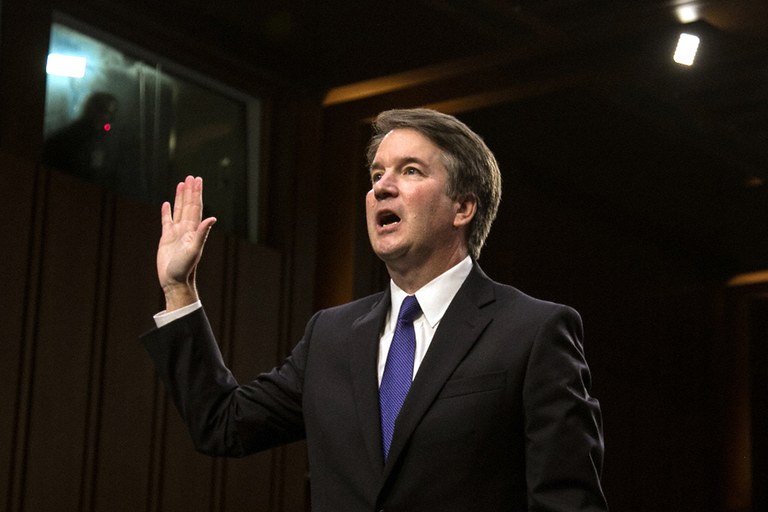The Kavanaugh Nomination
Politics for People Who Don’t Understand Politics
TW: sexual assault
Centrism has been on a consistent rise in the United States — people have been losing faith in the power of their vote, the power of their party, the power of their opinions, and the power of politics. Voter turnout creeps lower and lower into each voting season. In today’s world, being partisan is difficult, but so is avoiding the constant talk of White House events — long gone are the days of “no speaking of politics, religion, or money”. It is crucial to be aware of the events that take place both nationally and globally in order to hold a conversation and to be an educated young adult living in our current political climate.
Regardless of party or beliefs, it is essential to understand what is headlining the news, so consider this series an outline (or perhaps just a really compressed Wikipedia page). From here, I hope that even people who despise or don’t understand politics will have enough background information to peruse news articles effortlessly. As young adults today, we must understand public affairs — whether we like it or not — centrism and naivety simply won’t cut it.
One of the more present topics in the headlines recently has been Trump’s nomination of Brett Kavanaugh for the Supreme Court. The Supreme Court is, according to The United States Courts, composed of a group of justices– 10 following the confirmation of Kavanaugh– who serve a lifetime position interpreting the constitution and balancing the power of the other branches of government. Following the retirement of Justice Anthony Kennedy — the 2nd oldest Supreme Court Justice and a swing vote (a judge that does not consistently vote with a party or ideology and may tip the scale in one direction or the other) since 1988 (CNBC) — Trump was given the opportunity to politically reshape the high court. Justice Kennedy was vital in liberal rulings during his time on the court, such as the legalization of same-sex marriage and the passing of the Affordable Care Act, which meant that a right-wing nomination on Trump’s behalf could completely shift the Supreme Court’s stance on key left-wing rulings.
In early July, President Donald Trump nominated Brett Kavanaugh, a federal appeals judge who served under the Bush administration and became known for his investigation of Bill Clinton. A tried and true Republican, it was guaranteed from the get-go that his nomination would cause a storm in the Senate. When measured by the Judicial Common Space score — a strategic scoring guide that places Justices on a political spectrum — Kavanaugh was noted as being far more conservative than Justice Kennedy.
His political leanings are not, however, the only factor that Democrats have been protesting. He has recently been accused by several women of sexual assault, and one allegation by Dr. Christine Blasey Ford has gone as far as an FBI investigation and a Judiciary Committee hearing. The hearing called for the testimony of Dr. Ford, in which she alleged that Brett Kavanaugh (and a friend, Mark Judge) had sexually assaulted her during a high school party in 1982 in which he was intoxicated: a testimony that gripped audiences nationwide. Kavanaugh struck back with a rage-filled defense — claiming “[the assaults are] not accurate as to me. I have not questioned that she might have been sexually assaulted at some point in her life by someone someplace. But as to me, I’ve never done this” (Vox). In the wake of the Me Too movement, arguments broke out on both sides regarding both the legitimacy of Dr. Ford’s testimony and whether Kavanaugh has a place in any court — let alone the Supreme.
As called for by swing Senators and Dr. Ford, the FBI investigated Judge Kavanaugh in a limited scope following only leads deemed credible by the White House under the criteria of Republican Senators. This has led to a “fight between Democrats and Republicans over the 45-page FBI report that Senators have been able to review in the Senate’s secure spaces ahead of a key procedural vote Friday on the Supreme Court nominee [Kavanaugh]” (CNN). The credibility of the investigation as a whole has been questioned by Democrats who wonder if the probe was remotely thorough.
On October 6th, 2018, Brett Kavanaugh was officially confirmed by the Senate to be a Supreme Court Justice. Falling mostly along party lines, the vote fell at 50 votes for him and 48 against. People have been quick to point out the similarity to 1991 when Judge Clarence Thomas was accused by Anita Hill– among others– of sexual misconduct and still managed to be confirmed onto the Supreme Court. Sexual assault allegations have not been preventative in keeping justices off the court in the past, and they still are not today. Protests against the confirmation will continue, as many worry about the safety of key liberal rulings and the integrity of the court (and our country) with two alleged assaulters as Judges. To Donald Trump and supporters of Kavanaugh, this confirmation has proved to be a great success for the Republican party.

Harley is a senior at FGHS and is the Editor-in-Chief of the Advocate. She is passionate about the news and believes that the press is extremely important...


























































































































Belinda Church Hanley • Oct 26, 2018 at 3:05 pm
Thank you, Harley, for writing about this important issue. I’m 67 years old. I know many sexual assault survivors. We are all feeling very shaky right now. It was hard for me to watch the testimonies. It was hard for me to realize there were people who thought Kavanaugh acted like a judge. I thought he was privileged and self-centered.. I am concerned that in our society and in our school, we continue to give some groups special privileges.